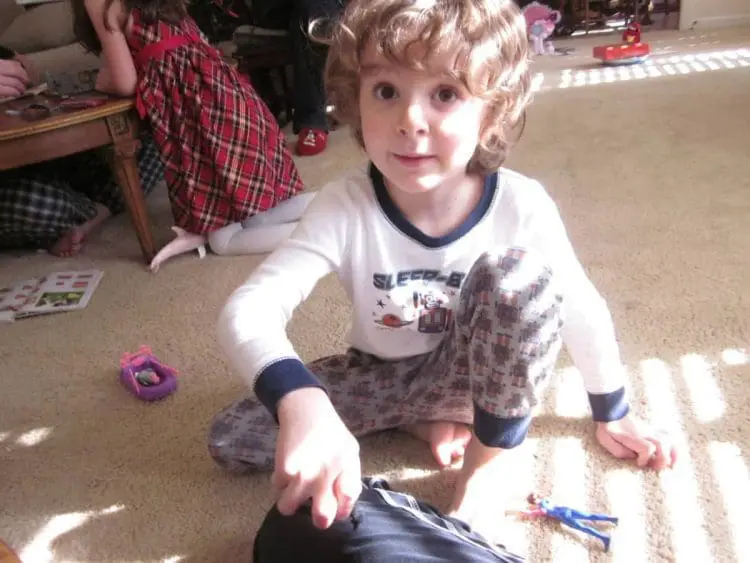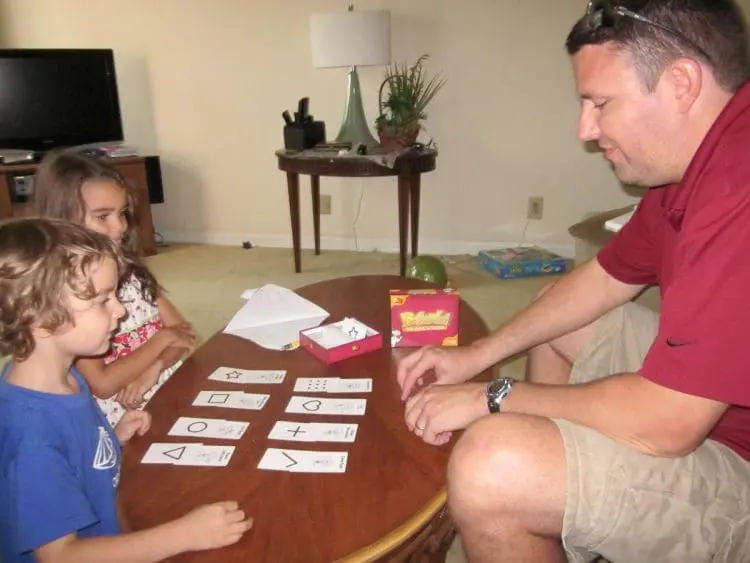A strong willed child is often regarded in either a very positive light or a very negative light, depending on your preconceptions. So is strong willed bad? I certainly don’t think so. As with most things, there are positives and negatives to being strong willed. An iron-willed child will be resolute and determined. Those are great qualities in the right circumstances. In fact, they can make for great leaders! However, a strong-minded child can also be inflexible and mulish. Those qualities generally result in more negative behaviors. If you are parenting a strong willed child, you may be about at the end of your rope. Don’t fear. Take a deep breath, help is here.

The Strong-Willed Child
What is a strong willed child? They often want to do things their way and on their own. Once they set their mind on something, they can be very determined. They tend to question everything and want to understand the reasons behind rules.
If your spirited child:
- Engages in frequent temper tantrums
- Doesn’t accept instructions at face value
- Seems to enjoy arguing with you over everything
- Likes to ask “why” on a regular basis
- And tends to be outspoken and disruptive
Then, you’re probably parenting a strong-willed child. Headstrong kids like to learn things for themselves instead of accepting what others tell them. They want to be in charge of themselves so strong willed children usually test the limits you set. They will often desire to do what they think is the right thing above everything else.
This can certainly create some difficult and challenging days for parents. It’s a good thing to accept your child’s temperament and encourage them to think for themselves. This can help avoid constant power struggles. On the other hand, they also need to learn that there are boundaries and expectations that they will need to comply with in the real world.
Often the biggest challenge for children with these personality traits is getting them to respect authority. At difficult times you may console yourself with the fact they will make strong leaders someday! Delve into the psychology behind the behavior of strong-willed children and uncover the reasons behind their stubbornness. Gain valuable insights into their needs, motivations, and emotions, and learn how to respond effectively to promote their emotional well-being.

How To Parent A Strong Willed Child
Some people would say, “how to deal with a strong willed child” but I think that sounds a bit negative. Remove your preconceptions that “they need to be dealt with” and replace them with a more positive framing. What you really want to figure out is how to parent a strong willed child. These tips will help you set boundaries with your strong-willed child’s behavior while also giving them the space they need to be themselves. Consistently working in a loving way to strengthen the parent-child relationship and set clear expectations will help reduce behavior problems.
Discover how to navigate the challenges of parenting a strong-willed child by embracing their independence. Learn effective strategies to foster their self-confidence, set reasonable boundaries, and build a harmonious parent-child relationship. Learn how to leverage praise, encouragement, and constructive discipline to nurture their unique qualities and help them thrive. Raising a strong-willed child can be both challenging and rewarding. Here are some strategies to help:
1. Establish Family Rules
Gather all of the family members for a family meeting about the rules you want to set. Explain the expectations and what your kids can expect the result to be if they don’t comply. Welcome feedback from your kids about rules they feel are important or why they feel certain rules aren’t important. Explain that the rules are for everyone and ask your child if they understand the rules and the consequences of breaking them. Once you have this buy in from strong willed kids, it is more likely they will make good choices.
2. Create Predictability
Strong-willed children don’t do well when their power is taken away from them. Creating structure helps them to know what is expected of them. And if a day is going to be a little off from the norm, talk to your child about it ahead of time. In this way, they know what to expect beforehand instead of expecting them to adjust at a moment’s notice. Taking time to communicate with them about changes will help avoid their frustration and resulting disruptive behavior.
3. Forget Ultimatums
A strong-willed child will see an ultimatum as a challenge and they won’t back down. If they misbehave and you give them a time-out until they’re ready to cooperate, they’ll sit in time-out all day long. Instead, encourage cooperation by working with them. Next time, instead of giving them time-out until they’re ready to clean up their toys, work together to clean them up. This will has the added benefit of helping them learn to work together with others.
4. Be Patient
Furthermore, delaying gratification can be a better way of encouraging your child to cooperate than time outs. For instance, they can’t go outside to play or ride bikes until the toys are cleaned up. They’ll be more inclined to do the thing they don’t want to do so that they can do the thing they do want to do. Instead of getting involved in a battle of wills, they will mostly like chose the good behavior themselves in order to get what they really want.
5. Pay Attention
Your child may not be able to accurately verbalize what they’re feeling, but they’ll show it in their actions. Pay attention to their frustration and anger levels. When do they feel the most frustrated, what is upsetting them, and how do they handle it? These can be clues to help you figure out how to best help them cope. Remember that younger children are still learning to identify their own emotions and understand how to communicate big feelings. A child’s emotions are sometimes confusing to them as well. However their behavior offers a clue. A defiant child displaying aggressive behavior usually feels something is unfair and they feel angry. If you can find a way to help them express themselves with their words, they will often feel better and behave better.

More Resources For Raising A Strong Willed Child
Want more reading on the subject? Try the very well reviewed book, Parenting The Strong-Willed Child: The Clinically Proven Five-Week Program for Parents of Two- to Six-Year-Olds (affiliate Amazon link). This classic by Rex Forehand, Ph.D. and Nicholas Long Ph.D. has helped hundreds of thousands of parents with disciplining a strong willed child using positive reinforcement. They have lots of great ideas for managing the strong-willed temperament in effective ways.
Another great resource for parents is the new book Blue Star Grit: A Mother’s Journey of Triumph and Tragedy Raising a Defiant Child into an Exceptional Leader, (affiliate Amazon link) which was released on May 2, 2023. The author is Ginny Luther, an Educational and Family Behavioral Consultant. She provides information is a very accessible way and offers really great practical advice. Here is one of her tips on avoiding power struggles:
“Although defiance is a sign of leadership it can be difficult to manage. Many adults respond to defiance with the false belief that they can “make” their child change! They offer either threats, bribes or coercive strategies in order to “get” them to comply. Anyone dealing with twos or teens knows it can end very badly with everyone losing!
When children defy they are attempting to make the world go their way, not because they are selfish but because they need to develop a sense of autonomy–a self that is unique from others–a sense of “I”. They are essentially developing free will–the basis of democracy. Free will is nurtured through choice not force!
Next time you are in a power struggle with a child, try offering two limited positive choices and acknowledge their choice. If your child says, “No, I don’t want to go to bed.” Say, “You were hoping you could stay up later. You have a choice. You can choose to brush your teeth first or get into your pajamas. What works best for you?” Remember to wait with them until they choose. If they continue to defy, keep presenting the two choices.
Once they choose, acknowledge their choice: “That was a hard choice, but you did it. You chose pajamas.” Avoid using people-pleasing external praise (“Good Job” “That makes mommy happy” “Good girl”) which can often retrigger the defiance, especially those who have leadership personalities that are tenacious. When you notice their choices, they are able to take ownership and support the development of their sense of ‘I’.”
Conclusion
Do not allow your children’s behaviors to cause you despair. A strong-willed child can certainly test your patience, but they’re also free thinkers, go-getters, and independent- all qualities you want to encourage! By helping a strong-willed toddler find the best ways to express themselves and deal with the times they have to comply with rules, you’ll both find some satisfaction. As you help these experiential learners with problem solving difficult situations, you will see headstrong children improve their behavior in important ways.
Unlock the secrets of effective negotiation when parenting a strong-willed child. Discover techniques to find common ground, empower your child to make choices within limits, and develop problem-solving skills that promote cooperation and reduce conflict. I hope these tips for parenting a strong willed child help you find an effective style of parenting and reduces behavioral challenges. Being a positive parent with happy kids will suit you all better. Which suggestion did you find the most helpful in dealing with your child’s behavior?
Related Posts:
The Power of Positive Parenting

Jenny says
Parenting a child is always tough especially when your child is iron-willed. My nephew is very similar to the nature described here. So, I can understand all these situation when he keep asking me various questions and keep arguing about little-little things. Sometimes, I got frustrated. I have tried making rules for him, but never worked. I will definitely try these other hacks. Hope, I can manage to handle his strong opinions in a well-manner. Thank you for sharing!
Rex says
This info on strong willed kids is a good reminder not to break their spirit but there are many upsides to have a strong will. It helps to know these techniques for getting kids to be more cooperative though when we need to get things done. I like the idea of providing them some control by offering limited choices.
Rahul Sharma says
As a new parent, this is just what I wanted to read. Very reassuring. It is a good reminder to respond to their intensity with calmness. This helps de-escalate situations.
Gary Mann says
As I sit down to write this comment, my heart overflows with lot of emotions, gratitude, and a dash of exhaustion. Parenting is undoubtedly one of the most challenging tasks yet profoundly rewarding journeys one will ever embark upon.